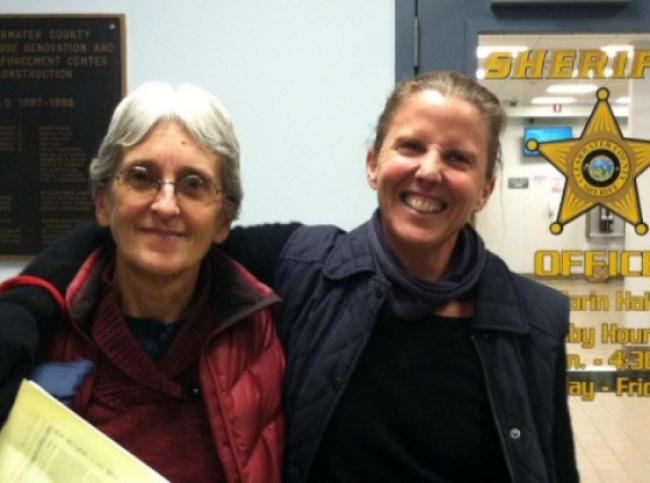Articles Menu

It ended almost as soon as it began.
In a stunning ruling that came just minutes after the jury was seated in the so-called valve turners trial in Clearfield County, Minn., the judge ruled that prosecutors had failed to meet their burden of proof that a group of activists had damaged a tar sands pipeline when they trespassed on private property to shut down the pipeline.
The judge dismissed all charges against the defendants: Emily Johnston and Annette Klapstein, who were facing up to 10 years on felony counts related to the incident, and Benjamin Joldersma, who faced misdemeanor charges for assisting them.
The ruling effectively short-circuited what many activists and legal scholars hoped would be a landmark trial and the first real test of the necessity defense. The defendants had planned to present evidence they trespassed to shut down an Enbridge pipeline carrying tar sands oil from Alberta because the pipeline represents a direct and immediate climate threat and their actions were their best option to confront the peril.
The activists and their lawyers wanted to win acquittal, but they also wanted to put climate change on trial in an American courtroom.
Earlier this year, an appeals court in Minnesota ruled that they could proceed with the necessity defense.
But just three days before the trial was slated to begin, Judge Robert Tiffany ruled that only five of the nine expert witnesses the defendants planned to call would be permitted to testify. That roster still included some heavy hitters, including former NASA scientist James Hansen, public health expert Bruce Snyder, former Cornell University professor and pipeline expert Anthony Ingraffea.
As late as Monday night, defense attorney Lauren Regan of the Eugene, Ore., based Civil Liberties Defense Center, remained confident that the witnesses and direct testimony from the defendants would sway a jury, even one in this archly conservative region of an otherwise purple state.
But they never got a chance.
Regan expressed mixed feelings about the result at a hastily arranged press conference on the courthouse steps. “We are obviously now relieved that the criminal charges have been dismissed,” Regan said, “but there’s a lot of work to do regarding climate change and the underlying issues.
“Of course we are ecstatic that we were acquitted,” Klapstein said. “That was awesome. But because we were unable to present our story to the jurors, we do want people to know that we took every precaution we could to make sure that the people of Clearwater County were safe. I spent 30 years practicing law, trying to protect people from all kinds of harms and I would never do anything to put people in harm’s way.”
The Clearwater County Attorney said through a spokeswoman that there are no plans to refile charges in the case.
That came as no surprise to Ingraffea, who had arrived after a multi-layover trip, but never got a chance to testify. “It’s a strategic loss on the part of the prosecution,” Ingraffea said. “They were willing to let the defendants go so that they didn’t have to endure the publicity around the necessity defense.”
[Photo: Valve turners Annette Klapstein and Emily Johnston were acquitted on Tuesday without using the necessity defense to justify their actions against climate change. Photo credit: Emily Johnston via Twitter]